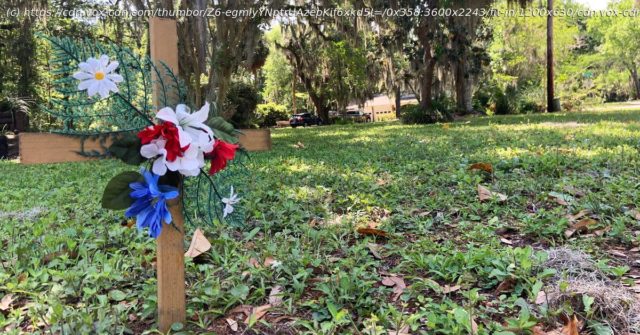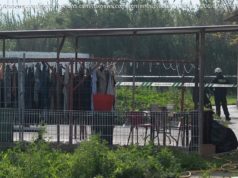A video of the Georgia man who was shot while jogging has intensified calls for a more rigorous investigation into his death.
The white men arrested in the shooting have been indicted on murder charges.
The three white men arrested in the fatal shooting of Ahmaud Arbery — an unarmed black man who was attacked while jogging — were indicted on murder charges Wednesday by a grand jury in Georgia.
Arbery was killed on February 23, when Gregory McMichael, 64, a retired district attorney investigator and police detective, and his son Travis McMichael, 34, armed themselves and followed him in a pickup truck after seeing him jog by. They later told police officers they believed Arbery to be a suspect in two burglaries in the Satilla Shores area.
The McMichaels — along with neighbor William “Roddie” Bryan, who filmed the incident — were arrested and charged last month with murder. And on Wednesday, District Attorney Joyette M. Holmes announced that the Glynn County grand jury had returned an indictment on all three defendants, including four counts of felony murder, two counts of aggravated assault, and one count each of false imprisonment and criminal attempt to commit false imprisonment.
While the shooting happened months ago, the case did not receive national attention until Bryan’s graphic video — released by Arbery’s family and showing the last moments of the 25-year-old’s life — went viral on May 5.
Arbery’s mother, Wanda Cooper-Jones, told CBS News that the video “proves that my son was not committing a crime. He was out for his daily jog and he was hunted down like an animal and killed.”
The footage sparked outrage among criminal justice advocates across the country, and led to the call for a grand jury to investigate the fatal shooting. The Department of Justice is also looking into hate crime charges and reviewing how Arbery’s killing was handled on the state and local levels.
Arbery’s death has been compared with the shooting deaths of many other unarmed black people, including 17-year-old Trayvon Martin and Botham Jean, who was killed in his Dallas apartment in 2018. Protests have continued in Georgia — where social distancing requirements were recently relaxed — with hundreds of people marching through Satilla Shores, promising to “run with Maud” and chanting, “We want justice!”
“The video is very clear that they were on the truck with guns hunting him down,” civil rights attorney Benjamin Crump, who represents Arbery’s father, told the Associated Press. “I don’t know what more you need to make an arrest.”
Prior to the video’s release, the only public record of Arbery’s final moments were the statements the McMichaels gave to police. An investigation into the shooting had been limited, as a series of prosecutors recused themselves from the case over their ties to Gregory McMichael. This has frustrated Arbery’s supporters, who argue that his killing — and the subsequent actions of local law enforcement — shows how little has changed in an area of Georgia that’s been described as dotted with Confederate flags, with a history of mobs of white men taking justice into their own hands in a manner that leaves black men dead.
Arbery, a former high school football star, was passionate about staying in shape, according to friends and family, who told the New York Times he often spent his free time running. He went for one such run on February 23, ending up in Satilla Shores, a few miles away from his home in Glynn County.
Gregory McMichael claims he was in his front yard when he saw Arbery “hauling ass,” after which he ran inside to get a weapon and his son, Travis. He told police that he said, “Travis, the guy is running down the street, let’s go.”
By “the guy,” he meant the person responsible for what some in the neighborhood have described as two burglaries. Larry English, a man whose home was under construction in the McMichaels’ neighborhood, said someone stole $2,500 in fishing gear from him earlier this year, but he never reported the theft, he told the Daily Beast;he also never accused Arbery of committing any crimes.
It has since come to light, however, that the Glynn County Police Department contacted English in December 2019, asking him to reach out to Gregory McMichael whenever he “got action” on his surveillance camera, according to the Atlanta Journal-Constitution. “Greg is retired Law Enforcement and also a Retired Investigator from the DA’s office,” Officer Robert Rash texted English, along with McMichael’s phone number. “He said please call him day or night when you get action on your camera.” English’s attorney said her client never took McMichael up on his offer.
Trespassing on English’s property was, apparently, a common occurrence. In mid-May, CNN obtained 11 surveillance clips from English’s attorney and found that multiple people, including women and children, had entered the home in the months leading up to Arbery’s death. The only confirmed instance of Arbery himself being on the property was on February 23.
The second burglary in the area was reported to police by Travis McMichael, who said a 9 mm pistol was stolen on January 1 from a vehicle parked outside his home. In the police report filed after Arbery’s killing, Gregory McMichael said the burglar had been caught on surveillance video and that Arbery matched the description of the suspect.
Домой
United States
USA — Criminal The killing of Ahmaud Arbery, an unarmed black jogger in Georgia, explained






